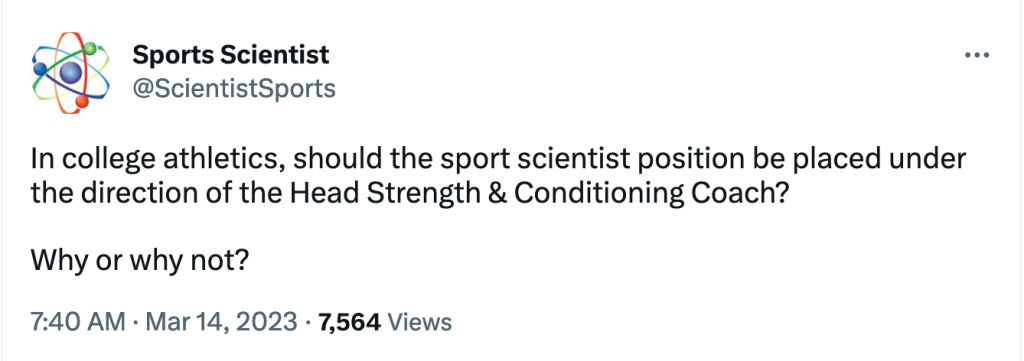A recent discussion on Twitter spurred some thoughts that I had with respect to titles and roles in sport and in particular the title/role of Applied Sport Scientist.
@ScientistSport posed the following question:
It’s an interesting question to ponder. Given that sport science was originally born out of physiologists attempting to study human performance in Olympic sport athletes (which then eventually bled into team sport athletes) the question makes sense. Moreover, it seems like people generally think of sport science as something directed at helping the team “train better” – monitoring training loads, testing strength, power and conditioning, and even entering into the discussion of return to play following injury. Such a role has led many teams to employ an Applied Sport Scientist.
Titles in sport are weird. What does an Applied Sport Scientist do? What is the description of the role? More importantly, is there a Non-Applied Sport Scientist? If so, what are they doing?
Generally, when I’ve been introduced to the Applied Sport Scientist at a team when I’ve found is they are an assistant strength coach or assistant athletic trainer that has been tasked with turning on GPS units, conducting force plate jumps with the players, and coordinating the reports from the team’s Athlete Management System (AMS).
No doubt these are important tasks and critical to helping the staff plan and manage the team’s training! But, why is this a science role? What’s scientific about it? Is the individual ensuring data quality and integrity is being maintained before it is stored in the AMS? Is the individual conducting scientific inquiry of the data within the AMS to understand the measurements being made and determining if the measures are valid, reliable, or responsive? More importantly, how is the individual using the abundance of data being collected to answer larger questions that are relevant to the entire organization?
Perhaps the role shouldn’t be called Applied Sport Scientist? Maybe it should be Data Collection Coordinator or something more descriptive of the task at hand? Titles matter! They define what we do and how we do it. Again, if there is an Applied Sport Scientist is there a Non-Applied Sport Scientist? Maybe the latter is the one doing the real scientific work – identifying the pertinent research questions, planning applied science studies, structuring and establishing best practice data collection methods, analyzing data, and communicating the results to the end users.
What should the role of an Applied Sport Scientist be?
While some may feel like my argument is a bit pedantic here is why it matters.
The aim of the Applied Sport Scientist or the Sport Science Department should be to answer questions across the entire sporting organization. This shouldn’t simply be limited to matters of strength and conditioning. Rather, the goal should be to apply the scientific method to any and all questions in sport – training, return to play, performance evaluation, player acquisition, team tactics, etc. – and work at the intersection of such topics to provide analysis that helps the key stakeholders make decisions. A few colleagues and I wrote a paper about the parallels between Business Intelligence and Sports Science a few years ago <CLICK HERE>.
Science isn’t just a title; it is a framework and process for asking and answering questions. Or, as David Salsburg states, in his brilliant book The Lady Tasting Tea: How Statistics Revolutionized Science in the Twentieth Century, “Science, we are often taught, is measurement. We make careful measurements and use them to find mathematical formulas that describe nature.” Consequently, someone that is given the title Applied Sport Scientist should actually have scientific training. The concept of framing a question, collecting data, doing basic statistics, knowing basic physiology and biomechanics, understanding how to run a simple reliability study, etc., are things that should be fundamental skills for this individual. Calling someone a Sport Scientist who doesn’t have these skills – even though they might be a really smart person and they might know a good deal about whatever technology they are using – is like calling me a strength coach. Sure, I can write a program and I can train and coach people. But, that’s probably not why you would hire me. Just as the strength coach can collect data and print reports, but you aren’t hiring them to conduct scientific investigations. You’re also not hiring the Physical Therapist to run the nutrition program.
Being smart and hardworking are important qualities in sport and everyone can help out in various areas of the organization. But titles should matter because they in some way define roles and responsibilities. The best organizations find the right people, with the right skill sets, to work together and create a super team.
As I like to say, Success boils down to four things:
- Knowing what you know.
- Working to be really good at what you know.
- Knowing what you don’t know.
- Knowing enough about what you don’t know to ask the right questions to get people in who can help you out with that thing.

